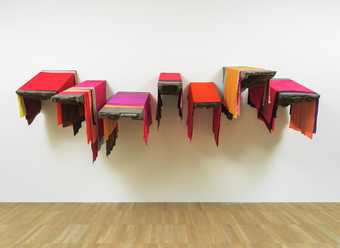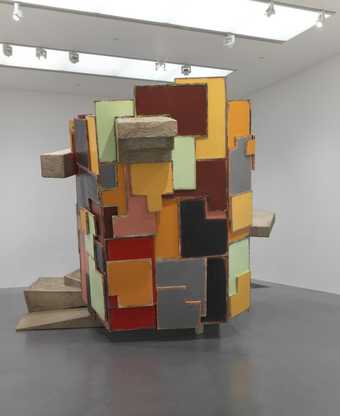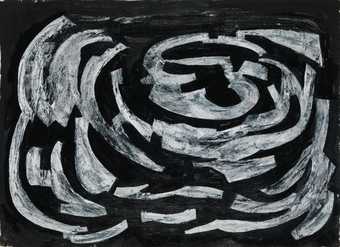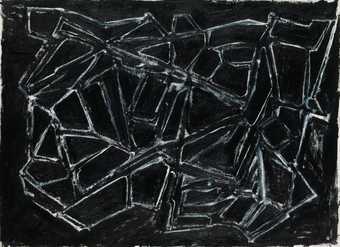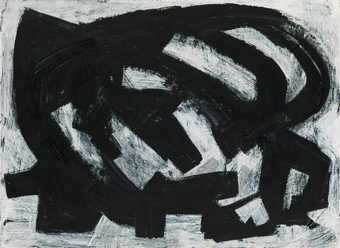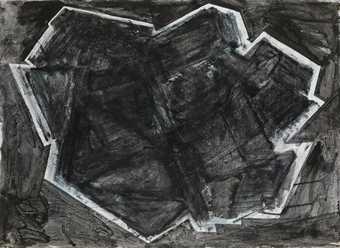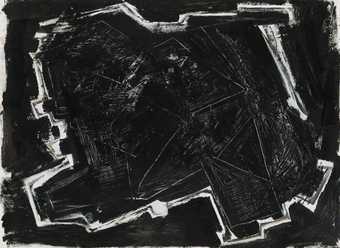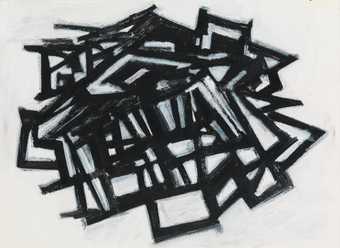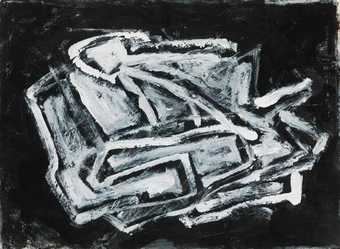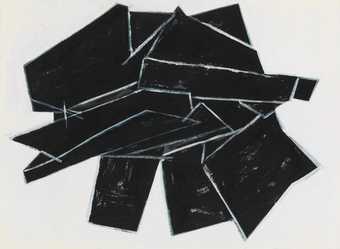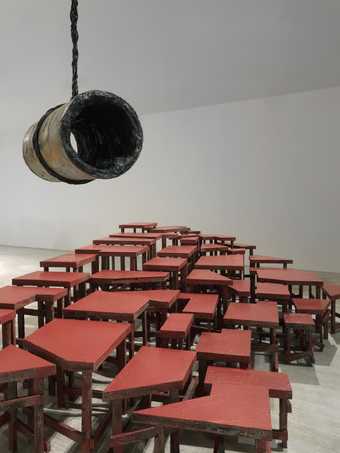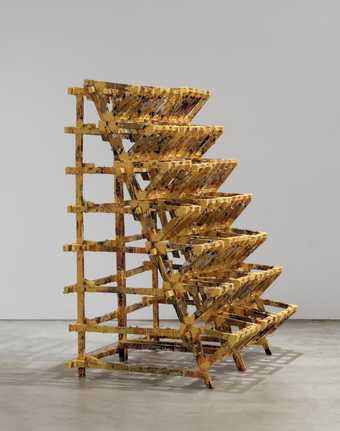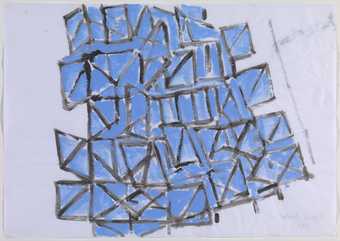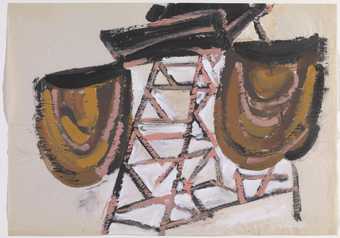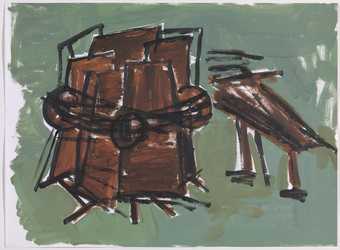Not on display
- Artist
- Dame Phyllida Barlow DBE RA 1944 – 2023
- Medium
- Steel, polyurethane foam, cement, wool, fabric, paint and pva
- Dimensions
- Object: 1640 × 1080 × 1170 mm
- Collection
- ARTIST ROOMS Tate and National Galleries of Scotland
- Acquisition
- ARTIST ROOMS Tate and National Galleries of Scotland. Presented by the artist and acquired with assistance from the ARTIST ROOMS Fund, supported by the Henry Moore Foundation and Tate Members 2016
- Reference
- AR01232
Summary
untitled: torque, 2015 2015 is a hanging sculpture, at the heart of which is a spiraling armature made of steel that appears to be turning endlessly around a metal axis. The armature is covered with a tangle of various materials such as polystyrene, cement, fabric and tape which have been painted in black, reds, pinks and oranges, colours that are characteristic of Barlow’s distinctive palette. The work is attached to a metal support mounted on the wall and it appears to be suspended in space, its linear shape resembling a knot or a scribble. Many of Barlow’s titles are descriptive of the physical action carried out to give shape to the materials used, and this is the case with this work, torque being the tendency of a force to rotate an object about an axis. Just as a force is a push or a pull, torque can be thought of as a twist to an object and, used in this context, it defines the physical shape that the sculpture has been given.
Barlow has described her work variously as ‘Big Bad [and] Ugly’ and as ‘wordless, wild, messy, unpredictable, ugly, difficult’ (quoted in Barlow 2004, pp.53, 63). From the late 1960s to today, she has focused on the physical experience of handling materials, which she transforms through processes of layering, accumulation and juxtaposition. Obtrusive and invasive, Barlow’s large-scale sculptural objects are frequently arranged in complex installations in which mass and volume seem to be at odds with the space around them. In her works, household materials such as carpets, sheets and ropes are often combined with cardboard, foam, Formica, polystyrene, concrete and timber, and held together through different actions such as cutting, slicing, sawing, breaking or wrecking, as well as coiling, folding, wrapping or covering. Rather than employing traditional working methods for sculpture, such as carving or welding, her work is characterised by accumulation and arrangement. Through an unmediated physical encounter with her materials, the artist manipulates structures and builds up surfaces.
Untitled: torque derives from Barlow’s interest in the ‘lump’, a base form that she considers to have been marginalised in British sculpture. In her proposal for her sculpture commission for Tate Britain’s Duveen Galleries in 2014, she wrote:
The ‘lump’, at its best, is unnameable and unrecognisable. This ungainly form, where both the inside and outside can be revealed, is definitively sculptural. For some time I have been reclaiming my previous experience of sculpture by making ‘lump’ sculptures again. It has been revitalising and challenging where experimentation with materials, processes, weight and gravity has been of prime importance. The sculptural object blocks, interrupts, intervenes, straddles, perches, and above all, occupies the space we might otherwise occupy ourselves. Despite its usually static identity, the sculptural object is restless and unpredictable in how it can use space. It is not necessarily a comfortable or comforting experience. And the ‘lump’, as the most primary of sculptural objects, is uncompromising in its blatant exposure of these attributes.
This contrary nature of Barlow’s sculpture is demonstrated in this hanging work which is at once structured and organic, static and dynamic, lumpish and yet apparently able to float in space.
Further reading
Phyllida Barlow, Objects For … And Other Things. Phyllida Barlow, London 2004.
Phyllida Barlow Peninsula, A New Baltic Commission 2004–5, exhibition catalogue, BALTIC, Centre for Contemporary Art, Gateshead 2005.
Phyllida Barlow Street, exhibition catalogue, BAWAG Contemporary, Vienna 2010.
Carmen Juliá
April 2016
Does this text contain inaccurate information or language that you feel we should improve or change? We would like to hear from you.
You might like
-
Dame Phyllida Barlow DBE RA untitled: awnings, 2012
2012 -
Dame Phyllida Barlow DBE RA untitled: upturnedhouse2, 2012
2012 -
Dame Phyllida Barlow DBE RA untitled: black 2, 2014/2015
2014–5 -
Dame Phyllida Barlow DBE RA untitled: black 3, 2014
2014 -
Dame Phyllida Barlow DBE RA untitled: black 4, 2014
2014 -
Dame Phyllida Barlow DBE RA untitled: black 6, 2015
2015 -
Dame Phyllida Barlow DBE RA untitled: black 7, 2015
2015 -
Dame Phyllida Barlow DBE RA untitled: black 9, 2015
2015 -
Dame Phyllida Barlow DBE RA untitled: black 10, 2015
2015 -
Dame Phyllida Barlow DBE RA untitled: black 11, 2014
2014 -
Dame Phyllida Barlow DBE RA untitled: brokenstage/hangingcontainer, 2012/2013
2012–3 -
Dame Phyllida Barlow DBE RA Untitled (Yellow Rack)
2006 -
Dame Phyllida Barlow DBE RA Untitled
1997 -
Dame Phyllida Barlow DBE RA Untitled
1999 -
Dame Phyllida Barlow DBE RA Untitled
2003


